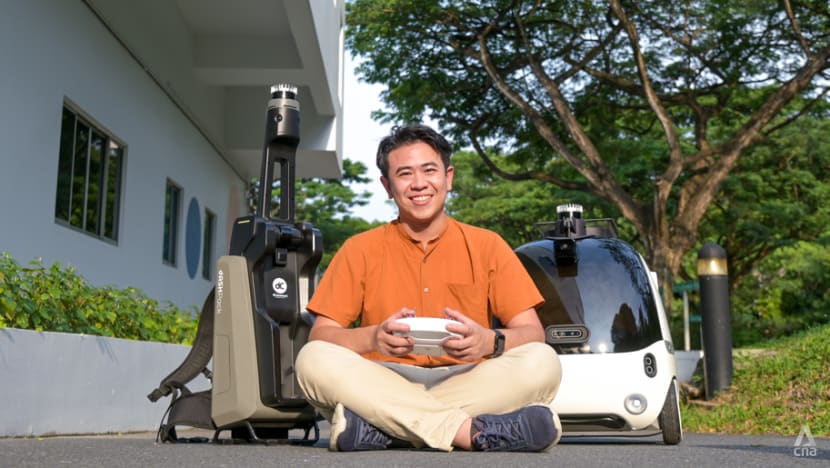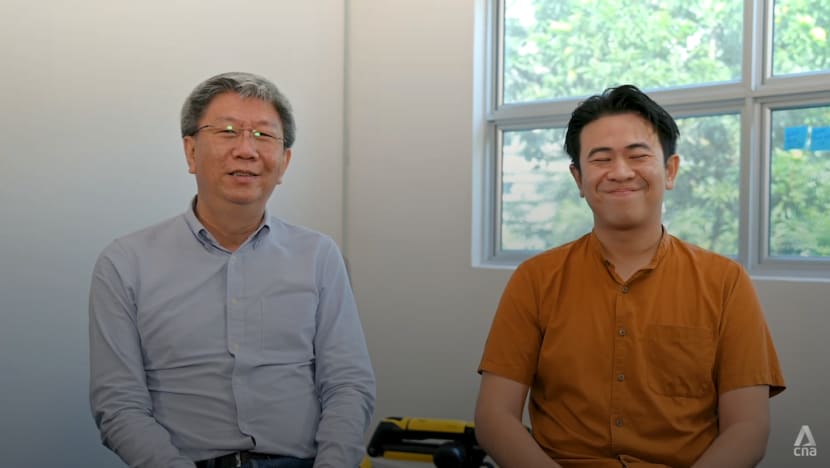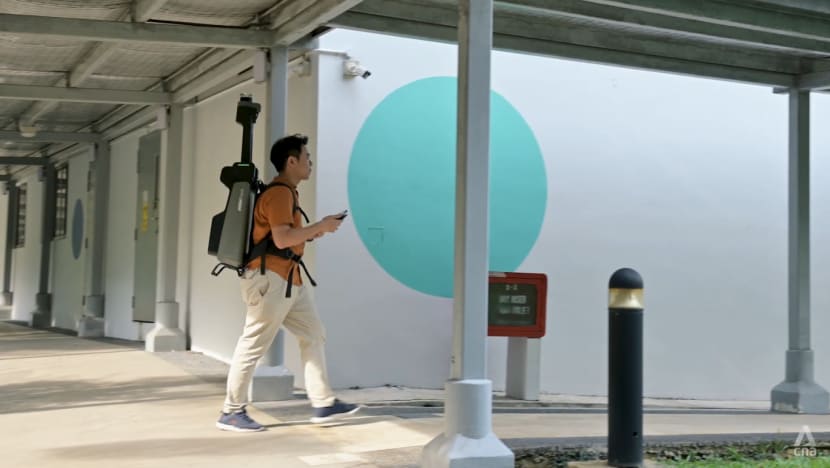This Thai engineer makes AI robots and mentors local grads. Here’s how he helps our workforce
Hiring foreign professionals in Singapore can be a stringent process. But the right individuals like Krittin Kawkeeree can add value by providing guidance to local entrepreneurs and emerging talents here.

Krittin Kawkeeree beams proudly, flanked by his inventions: The d.ASH Pack (left) and d.ASH-ER.

This audio is generated by an AI tool.
In partnership with the Ministry of Manpower
SINGAPORE: He had gone from a year exposed to the infinite possibilities of technology in the vibrant eco-system of Silicon Valley, to the Advanced Robotics Centre at the National University of Singapore, where he earned his master’s degree.
Krittin Kawkeeree, a Thai national, was well on the way to honing a particular set of skills and passions that just needed the right fit.
Around the same time, Singaporean technopreneur Chinn Lim was dreaming of “something big”. He and an acquaintance, who would become his chief technology officer, felt that the future was in robotics, coupled with the huge potential of artificial intelligence.
Lim launched his startup, dConstruct Robotics, in 2021. The goal was not any specific product — but to assemble a team that, with the right resources, could create solutions at the cutting edge of innovation.
But he struggled to attract the right people. “The talent for AI and robotics is rather scarce in Singapore,” he said of the nascent robotics scene.

“We’re also up against very established companies with very deep pockets,” he noted. “Chances are, if you were a Singaporean, you’d gravitate to that before a startup like ours.”
It took him a year to find Krittin, who was already developing autonomous robotics systems after his graduation. And he was exactly the person Lim needed to lay the foundation for his startup’s cutting-edge products.
“He had the unique combination of both the hardware and the software experience,” said Lim. “And that was something that we needed in an AI and robotics company.”
It was an equally serendipitous meeting for Krittin. Said the 30-year-old: “I want to invent something that can be sold, … that can appeal to customers. And that's where Chinn comes in and guides me (with his knowledge of customer needs).”
WATCH: I build robots for a living. Here’s why I chose to work in Singapore and how I’m giving back (9:51)
INVENTOR
Krittin joined dConstruct in 2021. With a team of robotics engineers, they have developed a fleet of autonomous robots using proprietary technology. Some of these robots inspect trains for SBS Transit; others, soon to be deployed, will check for defects and hazards along the corridors and staircases of HDB blocks.
Among them is d.ASH-ER, a four-wheeled automaton built to inspect environments, identify potential hazards and transport goods — but whose purposefully cute design “won’t look scary to children”, said Krittin.
Two of his own creations, the d.ASH Pack and d.ASH Xplorer, served as the foundation for dConstruct’s AI robotics product development. “Krittin played a very pivotal role for us,” said Lim, its chief executive officer.
As Krittin explained, when autonomous robots — such as those used to clean public areas like Changi Airport — are deployed, they must first map the area that they must navigate. This process can be “quite tedious and slow”.
So why not hasten that process with human foot power? Enter the d.ASH Pack, a backpack-like portable mapping device toted around by a person. Its sensors capture data that go towards generating a 3D model of the surroundings, which can then be fed to the autonomous robot.

“We’re able to cut down deployment time from, say, one hour to just 10 minutes,” said Krittin, who bears the title of dConstruct’s robotics engineering manager.
The d.ASH Xplorer is what processes d.ASH Pack’s data to generate 3D maps. It can be paired with a suite of additional features for various industries.
In construction, for example, the system can automatically compare the scanned data with predesigned 3D models, allowing for progress tracking. The d.ASH Xplorer employs machine learning to detect and analyse objects and people in the scan, filtering out unnecessary elements.
MENTOR
But Krittin is not just a talented builder of machines and systems — he also helps build crucial human capital for the startup.
Because of the difficulty faced in hiring experienced AI robotics engineers, dConstruct pursued instead “the strategy of working with interns from reputable institutes of higher learning” in the hope of “converting them to full-time staff”, said Lim.
This was possible, he said, because of “managers like Krittin who are very conscientious (about) imparting the skills, … (and) willing to train and teach the next generation of engineers”.
Take Koh Yang Kai — now a full-time engineer on the staff — whom Krittin has mentored since he started as a part-time intern over two years ago. He said Krittin often went the extra mile and provided case studies of existing products to address challenges they faced during the design process.

Fellow young engineer Chin Zheng Hao, also under Krittin’s wing, said: “He's very approachable. He’s extremely knowledgeable, but he's still constantly trying to push (the envelope). Looking at that does inspire you.”
Krittin in turn enjoys their energy. “The young Singaporeans I work with give us a lot of ideas that I’ve never thought of, and it's quite refreshing.”
He added: “I was given a lot of opportunities in Singapore — I believe I’m able to give back to new people who are starting their careers.”
HIRING DILIGENCE
Singaporeans now make up three-quarters of dConstruct’s workforce of 32. Its international staff hail from places like Malaysia, China, South Korea and Turkiye.
The ability to tap international talent has been critical to companies like dConstruct thriving and offering such opportunities for local talent.
Terence Ho, Associate Professor in Practice at the Lee Kuan Yew School of Public Policy, said: “The access to the international workforce allows Singapore to support a more diversified and sophisticated range of economic activities here.
“Naturally, this would spur investment and job creation, which provides more opportunities for local workers as well.
With Lim set on expanding into new markets, dConstruct needs to double its headcount by year end — and once again, the company will have to adopt stringent hiring criteria.
Since September last year, all new applications for Employment Passes have had to be evaluated through the Complementarity Assessment Framework (COMPASS). It is a points-based system introduced by the government to help companies select a high-quality foreign workforce, while improving workforce diversity and building a strong local core.
The framework comprises four foundational criteria: the candidate’s salary and qualifications, the diversity in the firm and its share of local professionals, managers, executives and technicians relative to industry peers.
For Lim, the goal is not diversity for its own sake. “I don’t see it as a foreign versus local situation. We're going to look at the person for the person’s capability. We want to make sure that person can bring value.”
The company’s newest robotics engineer, Garen Haddeler from Turkiye, had to undergo this evaluation when he was hired recently.

Given his experience in hardware and software, and his research work at the Agency for Science, Technology and Research, it was clear to Lim that “there weren’t many PhD AI robotics engineers out there at (Haddeler’s) level”.
Besides focusing on autonomous navigation strategies, Haddeler is also developing a curriculum to share his knowledge with students at local technical colleges and higher education institutions.
“The internet has lots of information on robotics … but it’s a bit messy,” he said. “We make it easier for students to grasp the idea of robotics and the theory.”
Lim emphasised that the viability of any industry hinges on the presence of emerging talent to sustain it.
Indeed, Krittin could someday find himself grooming young talent for his own start-up here.
“I’m trying to learn as much as possible … so that I can apply all this knowledge and these skills in future to start my own company,” he said. “That would be in Singapore. It’s a great place to start a company.”

















